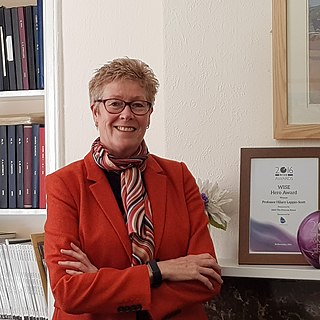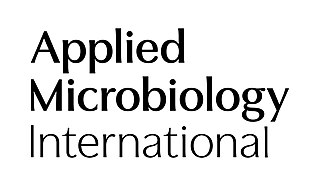Related Research Articles

The American Society for Microbiology (ASM), originally the Society of American Bacteriologists, is a professional organization for scientists who study viruses, bacteria, fungi, algae, and protozoa as well as other aspects of microbiology. It was founded in 1899. The Society publishes a variety of scientific journals, textbooks, and other educational materials related to microbiology and infectious diseases. ASM organizes annual meetings, as well as workshops and professional development opportunities for its members.
The Royal Academies for Science and the Arts of Belgium (RASAB) is a non-governmental association that promotes and organises science and the arts in Belgium by coordinating the national and international activities of its constituent academies such as the National Scientific Committees and the representation of Belgium in international scientific organisations.
The Microbiology Society is a learned society based in the United Kingdom with a worldwide membership based in universities, industry, hospitals, research institutes and schools. It is the largest learned microbiological society in Europe. Interests of its members include basic and applied aspects of viruses, prions, bacteria, rickettsiae, mycoplasma, fungi, algae and protozoa, and all other aspects of microbiology. Its headquarters is at 14–16 Meredith Street, London. The Society's current president is Prof. Gurdyal S. Besra. The Society is a member of the Science Council.

Miroslav Radman is a Croatian biologist.
J. Roger Porter was an internationally known microbiologist. Porter married Majorie Ann Perkins in 1934. He was the father of four children.

André Michel Lwoff was a French microbiologist and Nobel laureate of Russian-Polish origin.

Stefan Hugo Ernst Kaufmann is a German immunologist and microbiologist and is one of the highly cited immunologists worldwide for the decade 1990 to 2000. He is amongst the 0.01% most cited scientists of c. 7 million scientists in 22 major scientific fields globally.

Hilary Margaret Lappin-Scott FLS FLSW PFHEA FAAM FRSB is a British microbiologist whose field of research is microbial biofilms. In 2009 Hilary was elected as the second female President of the Society for General Microbiology (SGM) in 70 years and served in this role until 2012. In September 2019 she was elected as President of the Federation of European Microbiological Societies (FEMS), being the first President from the UK.

Applied Microbiology International, formally known as the Society for Applied Microbiology (SfAM), is the oldest microbiology society in the UK founded in 1931. Its objective is to advance for the benefit of the public the science of microbiology in its application to the environment, human and animal health, agriculture and industry. Applied Microbiology International is an active member of the Royal Society of Biology, and the Federation of European Microbiological Societies. The organisation's current president is Professor Jack Gilbert.
The European Society of Clinical Microbiology and Infectious Diseases (ESCMID) is a non-profit international organization with headquarters in Basel, Switzerland. Its mission is to improve the diagnosis, treatment, and prevention of infection-related diseases by promoting and supporting research, education, training, and good medical practice. An important activity of the society is the organization of the annual European Congress of Clinical Microbiology and Infectious Diseases (ECCMID). This is recognized as the largest international forum for disseminating research in the fields of medical microbiology and infectious diseases for academic, clinical, and industry experts.
Umesh Chandra Chaturvedi was an Indian virologist, immunologist, medical microbiologist, CSIR Emeritus Scientist and a former chairman of the Bharat Immunologicals and Biologicals Corporation. The founder head of the department of microbiology at King George's Medical University, he is known for his studies on Dengue virus infection. Chaturvedi is an elected fellow of all the three major Indian science academies viz. Indian Academy of Sciences, National Academy of Sciences, India and the Indian National Science Academy as well as the Royal College of Pathologists and National Academy of Medical Sciences. The Council of Scientific and Industrial Research, the apex agency of the Government of India for scientific research, awarded him the Shanti Swarup Bhatnagar Prize for Science and Technology, one of the highest Indian science awards for his contributions to Medical Sciences in 1981.

Tracy Palmer is a professor of microbiology in the Biosciences Institute at Newcastle University in Tyne & Wear, England. She is known for her work on the twin-arginine translocation (Tat) pathway.
The European Academy of Microbiology, generally abbreviated as EAM, is a European institution made up of about 150 microbiology scientists, founded in 2009.
The International Biodeterioration and Biodegradation Society (IBBS) is a scientific society with an international membership. It is a charity registered in the UK. IBBS belongs to the Federation of European Microbiological Societies (FEMS), along with national organizations from European countries and appears in the Yearbook of International Organisations On-line, published by the Union of International Associations. The aim of IBBS is to promote and spread knowledge of Biodeterioration and Biodegradation. Conferences are arranged on specific topics and every three years an International Symposium covering a wide range of research in these scientific areas is organized; the last (IBBS17) was held in Manchester, UK. Members can apply for various grants or bursaries. The Society's journal, International Biodeterioration and Biodegradation, is published by Elsevier.
FEMS Microbiology Letters is a peer-reviewed scientific journal covering all aspects of microbiology, including virology. The journal was established in 1977 and is published by Oxford University Press on behalf of the Federation of European Microbiological Societies. The Editor-in-Chief has been Dr Rich Boden of the University of Plymouth since 2014.
FEMS Microbiology Reviews is a peer-reviewed scientific journal publishing invited review articles in the field of microbiology. The journal was established in 1985, and is published by Oxford University Press on behalf of the Federation of European Microbiological Societies. The editors-in-chief are Karin Sauer, David Blackbourn, and Bart Thomma.
FEMS Yeast Research is a peer-reviewed scientific journal focusing on yeast and yeast-like organisms. The journal was established in 2001. It is published by Oxford University Press on behalf of the Federation of European Microbiological Societies and the editor-in-chief is John Morrissey.
Pathogens and Disease is a peer-reviewed scientific journal covering research on all pathogens. It was originally established in 1988 as FEMS Microbiology Immunology when it split from FEMS Microbiology Letters. It was renamed FEMS Immunology and Medical Microbiology in 1993, and obtained its current name in 2013.
Armen Trchounian was an Armenian biophysicist. D.Sc. in Biological sciences (1990) and professor (2002), Corresponding Member of NAS RA (2006) and Head of the Department of Biochemistry, Microbiology, and Biotechnology of Yerevan State University (2016–2020).

Eliora Zenziper Ron is an Israeli microbiologist who is the Secretary General of the European Academy of Microbiology and President of the International Union of Microbiology Societies.